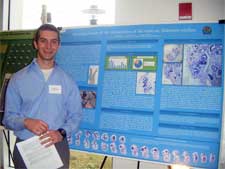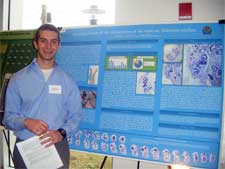 KINGSTON, R.I. – January 6, 2011 – University of Rhode Island senior Wayne Martini spent the last eight months analyzing the anatomy and reproduction of an invasive marine organism to understand how it spreads in massive mats along the seafloor. He hopes that his research will help to control its spread before it affects commercial fishing in the Northeast and threatens the health of the ecosystem.
KINGSTON, R.I. – January 6, 2011 – University of Rhode Island senior Wayne Martini spent the last eight months analyzing the anatomy and reproduction of an invasive marine organism to understand how it spreads in massive mats along the seafloor. He hopes that his research will help to control its spread before it affects commercial fishing in the Northeast and threatens the health of the ecosystem.
Martini said that the sea squirt Didemnum vixellum, which is thought to be native to the Mediterranean, is covering the seafloor in parts of Georges Bank, and has begun to affect the local aquaculture industry. In collaboration with URI Associate Professor Steven Irvine, he is working to identify a chemical or biological means of controlling the creature.
“We’re examining why they are invasive by trying to understand the foundation of their biological makeup,” said Martini, a Scituate resident majoring in biological sciences. “By understanding their anatomy and reproduction, it might open new pathways to control them.”
According to Martini, sea squirts like Didemnum grow via a process called pyloric budding, an unusual developmental system that enables these millimeter-sized sea creatures to grow into large, dense mats that can grow over and suffocate mollusks and other marine organisms living on the seafloor. He said they have spike-like spicules and acid-filled bladder cells on their outer surface that are thought to prevent them from being eaten by other organisms.
“Their pyloric budding is how they replicate themselves and spread out,” said the URI student. “If we can control this asexual pathway, then we could possibly stop their spread.”
Martini’s research was funded through the URI Coastal Fellows Program, a unique initiative designed to involve undergraduate students in addressing current environmental problems. Now in its 15th year, it is based at URI’s College of the Environment and Life Sciences. Students are paired with a mentor and research staff to help them gain skills relevant to their academic major and future occupations.
The next step in the Didemnum research is to extract the sea squirt’s DNA to learn what proteins control pyloric budding.
But Irvine will have to find another student for this step, since Martini completed his undergraduate degree at URI last month. He recently started work for an Oregon-based company that accepts donations of human cadavers for medical research and education. Martini said the job will provide him with training for conducting dissections, which will be tremendously beneficial for when he one day enrolls in medical school.
“My new job is an integral part of the health care system, and I’m excited to be a part of it,” he said.
“I’ve always wanted to be a doctor, but my interest grew because of a service trip I took to Nicaragua with the URI Catholic Center. One individual I met while I was there was severely lacking in medical care – a mentally challenged orphan. Knowing that I could help him inspired me to go to medical school. I want to help people like him get better medical care and enable them to have a higher quality of life,” he added.

